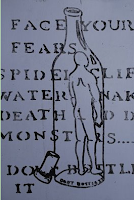Looking deeply at our fears, we are told to "put them down on paper, even though we had no resentment in connection with them," as fear is "an evil and corroding thread" that runs through "the fabric of our existence." All these fears, great and small, we are to find, cut us off from what Bill W. called "the sunlight of the Spirit."
[Alcoholics Anonymous, pp. 64-68.]
"Small fear is fearful," writes Thomas Cleary in his translation of "The Essential Tao," great fear is slow. In action they are like a bolt, an arrow, in their control over judgment. In stillness they are like a prayer, a pledge, in their attachment to victory." Thus, we read in the 'Big Book,' it is fear that "set(s) in motion trains of circumstances which brought us misfortune we felt we didn't deserve."
In the face of fear the human tendency is to fight, take flight or freeze. Consumed and identified as we are with the inner dialogue of the "self" or ego - a psychological phenomenon that is wholly dominated by fear, and the flip side of fear, desire - we usually choose the wrong option, freezing when we should take flight, fighting when we should freeze, etc.
"(Fears) kill like fall and winter," according to the Tao, "in the sense of daily dissolution. Their addictions to what they do is such as to be irreversible. Their satiation is like a seal, in that it disintegrates with age. The mind drawing near to death cannot bring about a restoration of positivity." The relentless and insatiable demands of the ego for perfect security and happiness, indeed, seem to place us beyond human aid.
"Joy, anger, sadness, happiness, worry, lament, vacillation, fearfulness, volatility, indulgence, licentiousness, petentiousness," says the Tao, "are like music issuing from hollows, or moisture producing mildew. Day and night they interchange before us, yet no one knows where they sprout. Stop, stop! From morning to evening we find them; do they arise from the same source?"
And, once again, we find that the source of all these fear-based states of mind is the "ego" - our selfish, self-centered smaller "self." ("The chief activator of our defects has been self-centered fear," we read in The Twelve Steps and Twelve Traditions, "primarily fear that we wold lose something we already possessed or would fail to get something we demanded.")
"If not for other, there is no self," according to the Tao. "If not for self, nothing is apprehended. This is not remote, but we don't know what constitutes the cause. There seems to be a real director, but we cannot find any trace of it. Its effectiveness is already proven, but we don't see its form. . . . Evidently there is a real ruler existing therein: the matter of whether or not we gain a sense of it does not increase or decrease its reality."
"(D)eep down in every man woman, and child," we read in the 'Big Book,' "is the fundamental idea of God. It may be obscured by calamity, by pomp, by worship of other things, but in some form or other it is there. . . . We found the Great Reality deep down within us. In the last analysis it is only there that it may be found."
[Alcoholics Anonymous, page 55.]
"We can only clear the ground a bit, the 'Big Book' continues. "If our testimony helps sweep away prejudice, enables you to think honestly, encourages you to search diligently within yourself, then, if you wish, you can join us on the Broad Highway. With this attitude you cannot fail. The consciousness of your belief is sure to come to you."(Excerpts from Thomas Cleary, "The Essential Tao," pp. 70-71.)



No comments:
Post a Comment